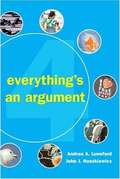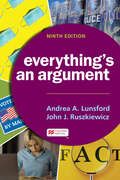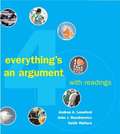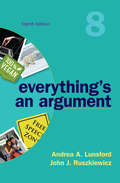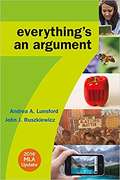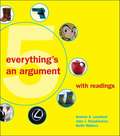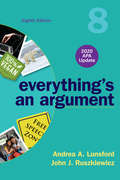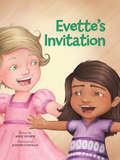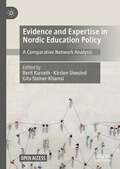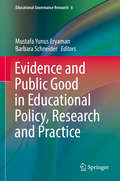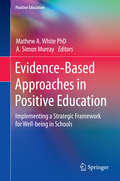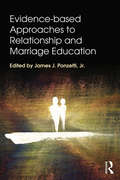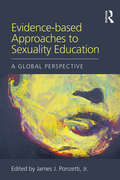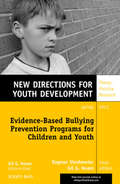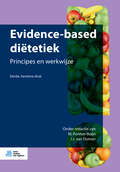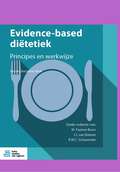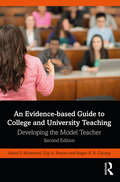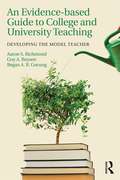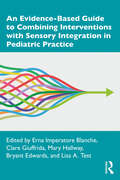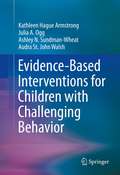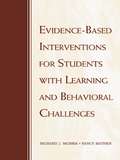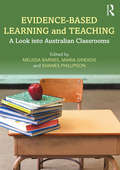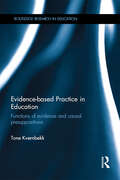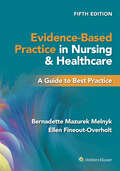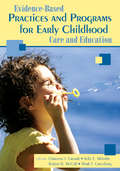- Table View
- List View
Everything's an Argument
by Andrea A. Lunsford John J. RuszkiewiczEverything's an Argument's unique, student-centered approach to teaching argument has made it the best-selling brief argument text on the market. The book's engaging, informal style shows students first how to read and analyze a wide range of argumentative texts -- verbal and visual, scholarly and "real world" -- and then how to use what they learn to write their own arguments. Andrea Lunsford and John Ruszkiewicz's instruction is fresh, elegant, and jargon-free, emphasizing inclusivity (moving beyond simple pro/con positions), humor, and visual argument to make Everything's an Argument immediately accessible. Students like this book because it helps them see and understand that a world of argument already surrounds them; instructors like it because it helps students construct their own arguments about that world.
Everything's an Argument
by Andrea A. Lunsford John J. RuszkiewiczEverything’s an Argument helps students analyze arguments and create their own, while emphasizing skills like rhetorical listening and critical reading. The text is available for the first time in Achieve, with downloadable e-book, grammar support, interactive tutorials, and more.
Everything's an Argument: With Readings
by Andrea A. Lunsford John J. Ruszkiewicz Keith WaltersDesigned to be a true alternative to traditional argument texts, "Everything's an Argument" takes a fresh and friendly approach to the subject by showing students that argument is everywhere. "Everything's an Argument with Readings" complements this approach with a uniquely broad range of examples--from essays to billboards to emails to radio programs--that help students recognize and respond to the arguments all around them.<P>Andrea Lunsford and John Ruszkiewicz's instruction is fresh, elegant, and jargon-free, emphasizing inclusivity (moving beyond simple pro/con positions), humor, and visual argument to make Everything's an Argument immediately accessible. Students like this book because it helps them see and understand that a world of argument already surrounds them; instructors like it because it helps students construct their own arguments about that world.
Everything's an Argument (7th Edition)
by Andrea A. Lunsford John J. RuszkiewiczTHIS TITLE HAS BEEN UPDATED TO REFLECT THE 2016 MLA UPDATES! Our editorial team has updated this text based on content from The MLA Handbook, 8th Edition. Browse our catalog or contact your representative for a full listing of updated titles and packages, or to request a custom ISBN. Everything's an Argument teaches students to analyze the arguments that surround them every day and to create their own. This best-selling text offers proven instructional content by composition luminaries Andrea Lunsford and John Ruszkiewicz, covering five core types of arguments. Revised based on feedback from its large and devoted community of users, the seventh edition offers a new chapter on multimedia argument and dozens of current arguments across perspectives and genres, from academic essays and newspaper editorials to tweets and infographics. Combine the text with LaunchPad for Everything's an Argument with Readings for even more engaging content and new ways to get the most out of your course. Access unique, book-specific materials in a fully customizable online course space; then adapt, assign, and integrate our resources with yours. This LaunchPad includes: Interactive exercises and tutorials for reading, writing, and research LearningCurve adaptive, game-like practice that helps students focus on the topics where they need the most help, such as fallacies, claims, evidence, and other key elements of argument Reading comprehension quizzes Also available in a full version with 35 additional readings.
Everything's an Argument with Readings (5th edition)
by Andrea A. Lunsford John J. Ruszkiewicz Keith WaltersThis best-selling combination rhetoric and thematically organized reader shows students how to analyze all kinds of arguments -- not just essays and editorials, but clothes, cars, ads, and Web site designs -- and then how to use what they learn to write their own effective arguments. With engaging, informal, and jargon-free instruction that emphasizes cultural currency, humor, and visual argument, Everything's an Argument is student-centered and immediately accessible. Students like this book because it helps them understand how a world of argument already surrounds them; instructors like it because it helps students construct their own arguments about that world.
Everything's An Argument with 2020 APA Update
by Andrea Lunsford John RuszkiewiczStreamlined and current, Everything’s an Argument helps students understand and analyze the arguments around them and raise their own unique voices in response. Lucid explanations cover the classical rhetoric of the ancient Greeks through the multimodal rhetoric of today, with professional and student models of every type. More important than ever, given today’s contentious political climate, a solid foundation in rhetorical listening skills teaches students to communicate effectively and ethically. Thoroughly updated with fresh new models, this edition of Everything’s an Argument captures the issues and images that matter to students today. LaunchPad for Everything’s an Argument provides unique, book-specific materials for your course, such as brief quizzes to test students’ comprehension of chapter content and of each reading selection. LearningCurve--adaptive, game-like practice--helps students master important argument concepts, including fallacies, claims, and evidence. Also available in a version with a five-chapter thematic reader.
Evette's Invitation
by Joseph Cowman Mike HuberIt's snacktime in Mr. Walter's classroom, and Evette has something to say. "Only kids with a baby sister can come to my birthday." Not everyone has a little sister-but everyone would like to be invited. Evette and her classmates begin a conversation filled with imagination and discovery. After lots of discussion, Evette knows just what to do to make her party the most fun.Evette's Invitation captures the rich, spontaneous, and oftentimes quirky conversations that young children bring to the table.The book contains a page of information to help adults connect the story to children's experiences.
Evidence and Expertise in Nordic Education Policy: A Comparative Network Analysis
by Gita Steiner-Khamsi Berit Karseth Kirsten SivesindThis open access book explores how policy makers draw on national, regional and international expertise in issuing school reform within five Nordic countries. In an era of international comparison, policy makers are expected to review best practices, learn from experiences from elsewhere, and apply international standards propelled by international organizations. Do they do so? What counts, for them, as evidence and expertise? The chapters draw methodologically on bibliometric data, network analysis, document analysis and expert interviews. They show compellingly how governments use “evidence” strategically and selectively for agenda setting and policy decisions. This book will be of interest and value to scholars of education policy, specifically within the Nordic region, and international and comparative education.
Evidence and Public Good in Educational Policy, Research and Practice
by Mustafa Yunus Eryaman Barbara SchneiderThis volume draws together interdisciplinary approaches from political philosophy, social work, medicine and sociology to analyze the theoretical foundations and practical examples of evidence-based and evidence-informed education for the public good. It presents a range of conceptions of the evidence-based and evidence-informed education and a justification for why the particular examples or issues chosen fit within that conception for the sake of public good. It explores the current literature on evidence-based and evidence-informed educational policy, research and practice, and introduces a new term, 'evidence free', meaning actions of some policymakers who disregard or misuse evidence for their own agenda. The demands about the quality and relevance of educational research to inform the policy and practice have been growing over the past decade in response to the Evidence-Based Education movement. However the literature is yet to tackle the question of the interrelationships between evidence, research, policy and practice in education for the public good in an international context. This book fills that gap.
Evidence-Based Approaches in Positive Education
by Mathew A. White A. Simon MurrayBased on action research and implementation at one of the world's great schools, this book provides a much-needed exploration of how to implement positive education at a whole school level. Evidence-Based Approaches in Positive Education summarises the integration of a whole-school mental health and well-being strategy, positive psychology programs and pastoral care models from 3 - 18 years of age. Positive education is the teaching of scientifically validated programs from positive psychology and character education that have an impact on student and staff well-being. It is an approach that focuses on teaching, building and embedding social and emotional learning throughout a student's experience. St Peter's College - Adelaide is the only institution in the world to integrate Martin Seligman's well-being theory throughout all aspects of both its strategic intent and positive education programs. The School's vision is to be a world-class school where all boys flourish. Its mission is to provide an exceptional education that brings out the very best in every boy. This is done within an intellectually and spiritually rich environment that nurtures international-mindedness, intercultural understanding, respect and a commitment to social justice. This book captures the developments of the St Peter's College journey. It focuses on the integration of well-being across seven strategic goals: Academics; Well-being; Student Life; Entrepreneurship; Innovation and Partnerships; People, Culture and Chan≥ Sustainability and Environment; Community Engagement, Advancement, and Philanthropy. A uniquely Australian school, the impact of a St Peter's College education is to build great men: who believe safety, service and integrity and fundamental parts of their lives; who are active members of communities that are socially and culturally diverse; who engage in political, ethical, and environmental challenges as good citizens. Since 1847, St Peter's College alumni have had global and life-changing impact in all fields of human endeavour. The School's alumni include three Nobel Laureates, 42 Rhodes Scholars, Olympians and Archbishops, artists and scientists, educators and journalists, actors and politicians, philanthropists and physicians, CEOs, diplomats and soldiers, explorers, painters and poets. This book shares evidence-based practices and makes a substantial contribution to the rapidly developing field of positive psychology and its application in schools.
Evidence-based Approaches to Relationship and Marriage Education (Textbooks in Family Studies)
by James J. Ponzetti Jr.This is the first book to provide a comprehensive, multidisciplinary overview of evidence-based relationship and marriage education (RME) programs. Readers are introduced to the best practices for designing, implementing, and evaluating effective RME programs to better prepare them to teach clients how to have healthy intimate relationships. Noted contributors from various disciplines examine current programs and best practices, often by the original developers themselves. Readers learn to critically appraise approaches and design and implement effective, evidence-based programs in the future. Examples and discussion questions encourage readers to examine issues and apply what they have learned. The conceptual material in Parts I & II provides critical guidance for practitioners who wish to develop, implement, and evaluate RME programs in various settings. Chapters in Parts III & IV follow a consistent structure so readers can more easily compare programs-- program overview and history, theoretical foundations, needs assessment and target audience, program goals & objectives, curriculum issues, cultural Implications, evidence based research and evaluation, and additional resources. This book reflects what the editor has learned from teaching relationship development and family life education courses over the past decade and includes the key information that students need to become competent professionals. Highlights of the book’s coverage include: Comprehensive summary of effective evidence-based RME training programs in one volume. Prepares readers for professional practice as a Certified Family Life Educator (CFLE) by highlighting the fundamentals of developing RME programs. Describes the challenges associated with RME program evaluation. The book opens with a historical overview of RME development. It is followed by 20 chapters divided in six parts. The initial four chapters focus on fundamentals of relationship and marriage education --program development, required training, delivery systems, and implementation. The three chapters in Part II consider important conceptual and theoretical frameworks used in RME. Part III considers best practices in inventory based programs while Part IV examines six skills-based programs. The chapters in Parts III and IV consider program overview and history, theoretical foundations, needs assessment and target audience, program goals and objectives, curriculum issues, cultural implications, evidence-based research & evaluation, and additional resources. This content covers four categories of effective programs -- design and content, relevance, delivery and implementation, and assessment and quality assurance. Part V presents evidence-based RME with diverse groups and Part VI reviews future directions. Intended for use in advanced undergraduate or graduate courses in relationship and marriage education, family life education, marriage and relationship counseling/therapy, intimate relationships, relationship development, or home/school/community services taught in human development and family studies, psychology, social work, sociology, religion, and more, this ground-breaking book also serves as a resource for practitioners, therapists, counselors, clergy members, and policy makers interested in evidence based RME programs and those seeking to become Certified Family Life Educators or preparing for a career in RME.
Evidence-based Approaches to Sexuality Education: A Global Perspective
by James J. Ponzetti Jr.This is the first book to provide a multidisciplinary and global overview of evidence-based sexuality education (SE) programs and practices. Readers are introduced to the fundamentals of creating effective programs to prepare them to design new or implement existing programs that promote healthy sexual attitudes and relationships. Noted contributors from various disciplines critically evaluate evidence –based programs from around the globe and through the lifespan. Examples and discussion questions encourage application of the material. Guidance for those who wish to design, implement, and evaluate SE programs in various social contexts is provided. Each chapter follows a consistent structure so readers can easily compare programs: Learning Goals; Introduction; Conclusion; Key Points; Discussion Questions; and Additional Resources. The editor taught human sexuality and family life education courses for years. This book reviews the key information that his students needed to become competent professionals. Highlights of the book’s coverage include: Interdisciplinary, comprehensive summary of evidence-based SE programs in one volume. Prepares readers for professional practice as a Certified Family Life Educator (CFLE) or sex educator by highlighting the fundamentals of developing and implementing SE programs. Exposes readers to evidence-based SE programs from various social contexts including families, schools, communities, and religious institutions. Considers the developmental context of SE across the lifespan along with programs for LGBT individuals and persons with disabilities. Critically reviews SE programs from around the world including the US, Europe, Asia, Africa, Latin America, and other developing countries. The book opens with an historical overview. Part I focus on general frameworks of sexuality education including UNESCO’s International Technical Guidelines. How to develop, deliver, and implement evidence based SE programs, including ethical concerns, are explored in Part II. Part III exposes readers to evidence-based programs in various social contexts--families, schools, communities, and religious institutions. Part IV considers the developmental context of SE from early childhood through adolescence and adulthood along with programs for LGBT individuals and persons with disabilities. Part V examines diverse global contexts from the US, Latin America, Europe, Asia, Africa, and other developing countries. The book concludes with future trends and directions. Ideal for graduate or advanced undergraduate courses in sex education, sexual health, human sexuality, sex or marriage counseling, intimate relationships, family life education, or home, school, and community services taught in human development and family studies, psychology, social work, health education, nursing, education, and religion, and in seminaries and family clinics, the book also serves as a resource for practitioners, counselors, researchers, clergy members, and policy makers interested in evidence based SE programs, or those seeking to become CFLEs or sexuality educators.
Evidence-Based Bullying Prevention Programs for Children and Youth: New Directions for Youth Development, Number 133 (J-B MHS Single Issue Mental Health Services #117)
by Dagmar Strohmeier Gil G. NoamBullying is a hot topic at schools across the nation. Chronic involvement in bullying is associated with many intrapersonal, interpersonal, and academic problems, and even sporadic experiences of bullying are harmful. During the last two decades, several prevention and intervention programs have been developed by research teams all over the world. Many of these programs have been adopted in the United States. This volume introduces five evidence-based anti-bullying programs developed in European countries, where much of the early innovations and adaptations have occurred. Based on state-of-the-art knowledge, This volume answers: How can educators detect that bullying is going on in their school? How can educators respond competently in acute bullying situations? How can educators prevent bullying in their schools in the long run? This is the 133rd volume of New Directions for Youth Development, the Jossey-Bass quarterly report series dedicated to bringing together everyone concerned with helping young people, including scholars, practitioners, and people from different disciplines and professions.
Evidence-based diëtetiek: Principes en werkwijze
by M. Former-Boon J.J. van DuinenDit boek biedt voedingskundigen en diëtisten handvatten om met de best bewezen zorg, de beste zorg op maat te bieden. Het laat zien hoe wetenschappelijk onderzoek gecombineerd wordt met de ervaring van de diëtist, de wensen van de cliënt en andere informatiebronnen, zoals het internet.
Evidence-based diëtetiek: Principes en werkwijze
by M. Former-Boon J.J. van Duinen R.W.C. SchuurmanDit boek beschrijft een gestructureerde aanpak om te komen tot optimale voedingszorg. Het is bedoeld voor diëtisten in de eerste- en tweedelijnszorg én voor studenten. Het boek draagt bij aan de professionalisering van de diëtetiek in Nederland en Vlaanderen.Evidence-based diëtetiek is een belangrijk onderdeel van het diëtistisch zorgproces. Het is een transparante beroepsuitoefening waarbij het verlenen van professionele voedingszorg gebaseerd is op informatie uit het beste wetenschappelijke onderzoek, de kennis en ervaringen van de diëtist en situatie, waarden en voorkeuren van de patiënt. Door deze gestructureerde aanpak komen diëtisten samen met de patiënt tot de best passende behandeling. Deze vierde druk van Evidence-based diëtetiek. Principes en werkwijze gaat in op de vijf stappen van evidence-based diëtetiek. Iedere stap is uitgewerkt in een apart hoofdstuk: het formuleren van een duidelijke vraag, het zoeken en vinden van wetenschappelijke bronnen, het beoordelen van de kwaliteit van bronnen, en het implementeren en het evalueren van de behandeling. Aan de hand van praktijkvoorbeelden illustreert het boek hoe professionals de vijf stappen kunnen toepassen. De auteurs hebben veel kennis en ervaring op het gebied van evidence-based diëtetiek. Ze werken als diëtist of zijn betrokken bij toonaangevende onderzoeken op voedingsgebied, werkzaam in academische ziekenhuizen en/of als docent.
An Evidence-based Guide to College and University Teaching: Developing the Model Teacher
by Aaron S. Richmond Guy A. Boysen Regan A. GurungAn Evidence-based Guide to College and University Teaching outlines a definition of "model teaching" based on research evidence and accepted best practices in high education. Teachers at all levels of skill and experience can benefit from clear, objective guidelines for defining and measuring quality teaching. To fulfil this need, this book outlines six fundamental areas of teaching competency—model teaching characteristics—and provides detailed definitions of each characteristic. The authors define these essential characteristics as training, course content, the assessment process, instructional methods, syllabus construction, and the use of student evaluations. This guide outlines through research and supplemental evidence how each characteristic can be used toward tenure, promotion, teaching portfolios, and general professional development. Additional features include a self-assessment tool that corresponds to the model teaching characteristics, case studies illustrating common teaching problems, and lists of "must reads" about college teaching. An Evidence-based Guide to College and University Teaching describes how college faculty from all disciplines and at all levels of their career – from graduate students to late-career faculty – can use the model teaching characteristics to evaluate, guide, and improve their teaching. The book is additionally useful for teachers, trainers, and administrators responsible for promoting excellence in college teaching.
An Evidence-based Guide to College and University Teaching: Developing the Model Teacher
by Aaron S. Richmond Guy A. Boysen Regan A GurungWhat makes a good college teacher? This book provides an evidence- based answer to that question by presenting a set of "model teaching characteristics" that define what makes a good college teacher. Based on six fundamental areas of teaching competency known as Model Teaching Characteristics outlined by The Society for the Teaching of Psychology (STP), this book describes how college faculty from all disciplines and at all levels of experience can use these characteristics to evaluate, guide, and improve their teaching. Evidence based research supports the inclusion of each characteristic, each of which is illustrated through example, to help readers master the skills. Readers learn to evaluate their teaching abilities by providing guidance on what to document and how to accumulate and organize the evidence. Two introductory chapters outline the model teaching characteristics followed by six chapters, each devoted to one of the characteristics: training, instructional methods, course content, assessment, syllabus construction, and student evaluations. The book: -Features in each chapter self-evaluation surveys that help readers identify gaps between the model characteristics and their own teaching, case studies that illustrate common teaching problems, discussion questions that encourage critical thinking, and additional readings for further exploration. -Discusses the need to master teaching skills such as collaborative learning, listening, and using technology as well as discipline-specific knowledge. -Advocates for the use of student-learning outcomes to help teachers better evaluate student performance based on their achievement of specific learning goals. -Argues for the development of learning objectives that reflect the core of the discipline‘s theories and applications, strengthen basic liberal arts skills, and infuse ethical and diversity issues. -Discusses how to solicit student feedback and utilize these evaluations to improve teaching. Intended for professional development or teacher training courses offered in masters and doctoral programs in colleges and universities, this book is also an invaluable resource for faculty development centers, college and university administrators, and college teachers of all levels and disciplines, from novice to the most experienced, interested in becoming more effective teachers.
An Evidence-Based Guide to Combining Interventions with Sensory Integration in Pediatric Practice
by Erna Imperatore Blanche Clare Giuffrida Mary Hallway Bryant Edwards Lisa A. TestThis book offers practical ideas on the combination of sensory integration theory principles with other evidence-based approaches in the evaluation and treatment of multifaceted issues in children with disabilities. Using the ICF Model, a Clinical Reasoning Model, and featuring numerous case studies, the opening chapters focus on the evidence for combining intervention approaches with diagnoses most often encountered in clinical practice. The latter half of the book covers the delivery of services using blended intervention approaches in different settings, such as the school, the hospital, and in nature. Featured are existing community programs illustrating the combination of approaches in practice. Appendices include reproducible resources, a guide to assessments, and approaches. The text will guide occupational therapists and other health professionals working with children and adolescents across a variety of settings in using clinical reasoning skills in a systematic manner that will lead to better interventions.
Evidence-Based Interventions for Children with Challenging Behavior
by Audra St. John Walsh Kathleen Hague Armstrong Julia A. Ogg Ashley N. Sundman-WheatWhen a child has difficulties eating or sleeping, or throws frequent tantrums, many parents cross their fingers and hope it's a phase to be outgrown soon. But when they persist, challenging behaviors can follow children to school, contributing to academic problems, social difficulties, and further problems in adolescence and adulthood. The authors of Evidence-Based Interventions for Children with Challenging Behavior take a preventive approach in this concise, well-detailed guide. Offering best practices from an extensive Response to Intervention (RTI) evidence base, the book provides guidelines for recognizing the extent of feeding, sleeping, toileting, aggression, and other issues, and supplies successful primary, secondary, and tertiary interventions with rationales. Case examples integrate developmental theories and behavior principles into practice, illustrate how strategies work, and show how to ensure that parents and caregivers can implement them consistently for maximum effect. Progress charts, content questions, and other helpful features make this an invaluable resource for students and professionals alike. Included in the coverage: The prevention model and problem solving.Screening techniques.Evidence-based practices with children and their caregivers.Behavior principles and their application.Monitoring progress and evaluating outcomes.Plus helpful appendices, resource links, and other learning tools. Evidence-Based Interventions for Children with Challenging Behavior is an essential text for graduate students, scientist-practitioners/professionals, and researchers in child and school psychology; assessment, testing and evaluation; occupational therapy; family; educational psychology; and speech pathology.
Evidence-Based Interventions for Students with Learning and Behavioral Challenges
by Richard J. Morris Nancy MatherThis book assembles into one volume summaries of school-based intervention research that relates to those who deal on a regular basis with the growing body of students having high-incidence learning disabilities and/or behavior disorders: special educators, school psychologists, and clinical child psychologists. Chapter authors begin with an overview of their topic followed by a brief section on historical perspectives before moving on to the main section – a critical discussion of empirically based intervention procedures. In those instances where evidence-based prescriptions can legitimately be made, authors discuss best practices and the conditions (e.g., classroom environment, teacher expertise) under which these practices are most effective. A final section deals with policy issues.
Evidence-Based Learning and Teaching: A Look into Australian Classrooms
by Sivanes Phillipson Melissa Barnes Maria GindidisEducation has become a political, economic and social priority for Australia, with the success of schools (and teachers) being an integral part of the economic and social future of the country. As a result, quality assurance for learning and teaching has become increasingly debated among policy-makers and the broader public, with a call for more evidence, data and standards to ensure that schools and teachers are held accountable for students’ learning outcomes. In response, this book provides a snapshot of the types of evidence and data relating to learning outcomes that are being collected in our classrooms within Australia. The chapters in this book seek to interrogate current views of learning and teaching, beyond what is measured in external assessments that only capture a limited view of student learning outcomes. The chapters explore a range of fundamental topics within education, including positive learning environments, student voice and assessment. They explore and articulate the vital knowledge and skills needed for current and future teachers. In addition, these chapters make clear links between teaching, learning and the theories that frame, shape and inform these learning and teaching processes. The research presented in this book provides practical and theoretical insights into learning and teaching in early years, primary, secondary and tertiary education.
Evidence-based Practice in Education: Functions of evidence and causal presuppositions (Routledge Research in Education)
by Tone KvernbekkMuch educational debate today is dominated by a "what works" vocabulary, intimately associated with evidence-based practice (EBP). The vocabulary consists of concepts and ideas such as accountability, competency, effectiveness, employability, learning outcomes, predictability, qualifications, and testing. As schooling and education are considered successful when predetermined outcomes have been achieved, education is often believed to require assessment, measurement and documentation. In this book, Tone Kvernbekk leaves the political, ethical and professional dimensions on the sidelines and focuses instead on further unpacking the core of EBP. Chapters concentrate on several fundamental issues ignored by current literature, including: the character of the evidence that plays a central role in EBP in both practical reasoning and acting under uncertainty the notion of causality presupposed by discussion of the production of desired effects and played out in the basic structure of interventions a system-theoretical look at why interventions might not work. By considering these key points, Kvernbekk articulates both the legitimate uses and the illegitimate, philosophically problematic misuses of EBP in educational thinking and practice. The book will be of key value for academics and postgraduate students in the fields of educational research and practice, philosophy of education and educational theory, especially those concerned with research methodology, professionalism, and discussions regarding evidence-based practice.
Evidence-Based Practice in Nursing & Healthcare: A Guide to Best Practice
by Bernadette Mazurek Melnyk Ellen Fineout-OverholdEvidence-Based Practice in Nursing & Healthcare: A Guide to Best Practice, 5th Edition, is a bestselling, easy-to-use guide to translating research findings to nursing practice and applying practice data for superior clinical decision-making. Using conversational writing, inspiring quotes, and an enhanced, case-based approach, AJN award-winning authors Bernadette Melnyk and Ellen Fineout-Overholt demystify evidence-based practice to help students deliver optimal patient care and become better nurses.
Evidence-Based Practices and Programs for Early Childhood Care and Education
by Dr Christina J. Groark Kelly E. Mehaffie Dr Robert B. McCall Mark T. GreenbergThis timely handbook presents evidence and recommendations to make informed decisions for planning, funding, and operating high-quality educational programs for children ages 3-8.
